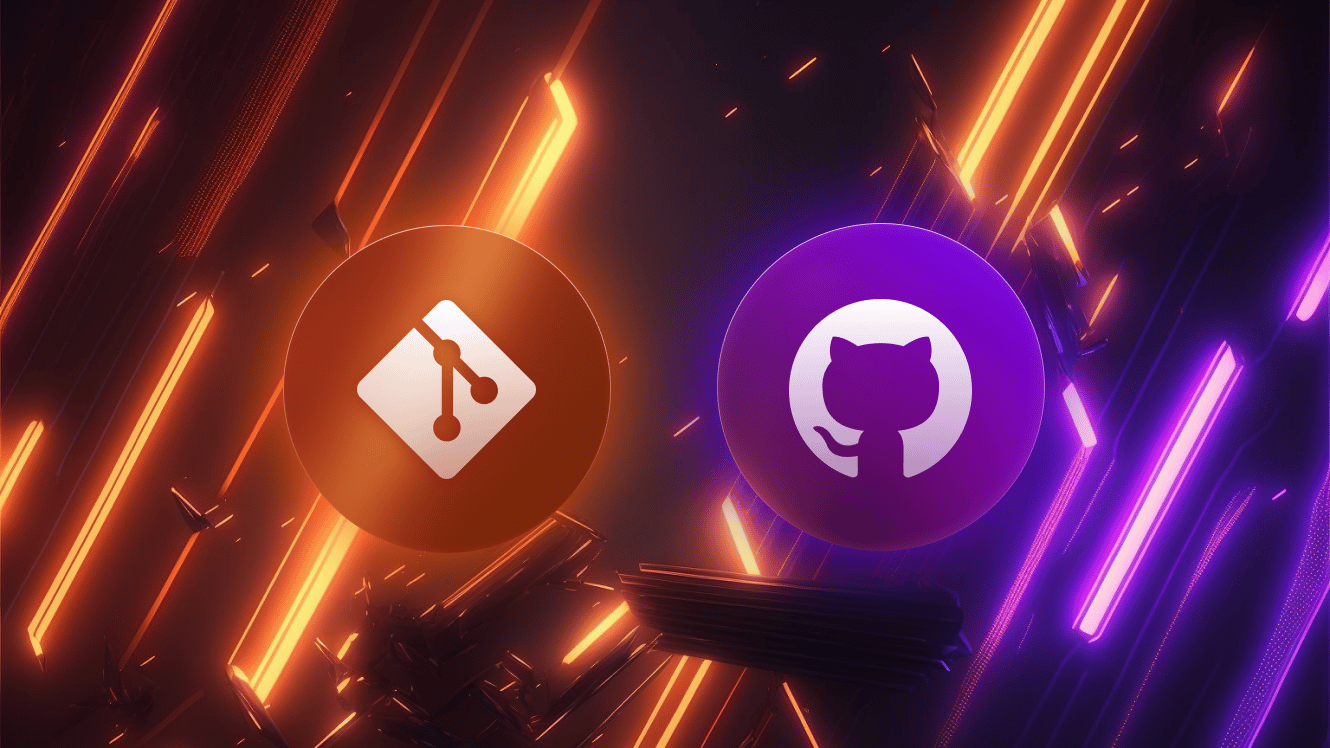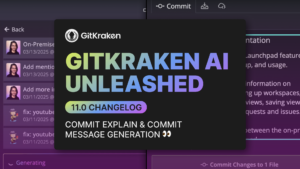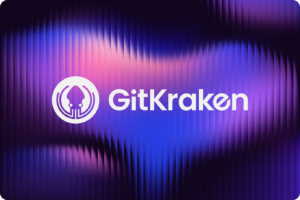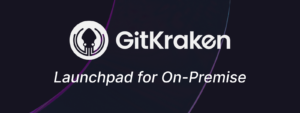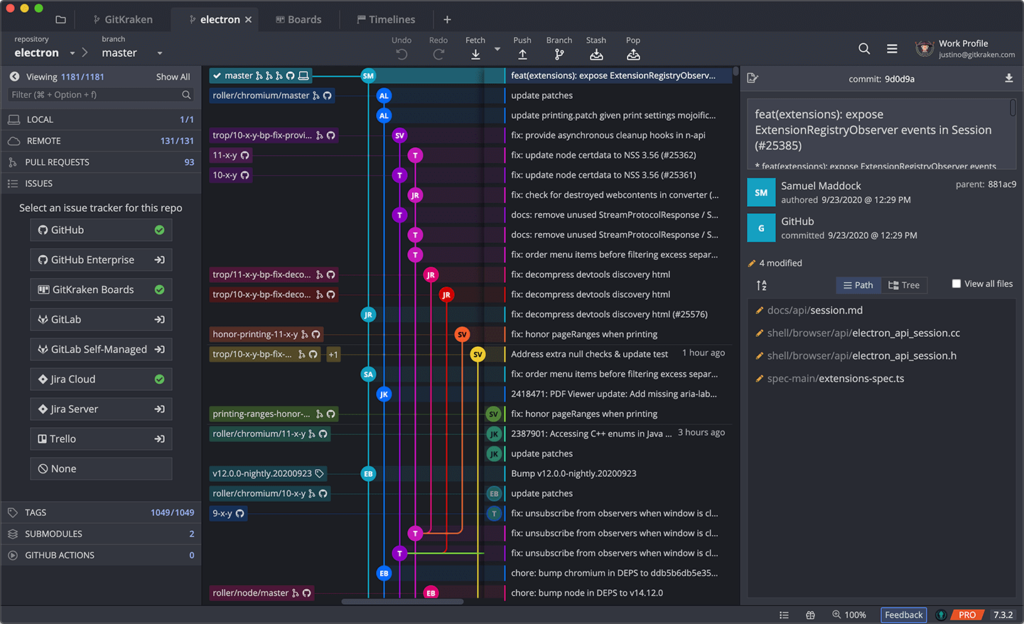Sophia Diachenko is a PR Manager at Syndicode, a leading digital transformation and products delivery company focused on marketplace creation, SaaS development, and web application development. In her free time, Sophia enjoys broadening her knowledge in the IT sphere.
Git and GitHub are two powerful tools widely used in software development, but what exactly are the differences between Git and GitHub? Both can help manage code, but they serve different purposes and capabilities.
Git is a version control system (VCS) that allows developers to track and manage changes to their code. Git tracks changes to files over time so developers can recall specific versions later on. GitHub, on the other hand, is a platform that provides a web-based interface for working with Git repositories where developers can collaborate on coding projects from anywhere in the world.
In this blog post, we’ll look at the differences between Git vs GitHub. Understanding the similarities and differences between Git and GitHub will empower you to use both tools to their fullest potential and take your coding to the next level.
What is Git?
At its core, Git is a version control system. It was initially created in 2005 by Linus Torvalds as an open-source alternative to proprietary tools like BitKeeper.
So, what is the purpose of Git? Git tracks changes to files over time and enables programmers to recall different versions of their code later on.
To accomplish this, Git stores snapshots of each change that have been made, allowing developers to return to earlier versions if necessary. Git also enables collaboration between multiple developers working on the same project.
Developers can create their own local copies of a repository (think of a repository, or “repo”, as a directory containing all the project’s files). They can then add/edit/delete files inside these local copies as they work on the project and push these changes to a central repository.
What is GitHub?
GitHub is a cloud-based hosting service for Git repositories. It was created in 2008 by Tom Preston-Werner, Chris Wanstrath, and PJ Hyett as a web interface for the open-source project hosting platform, SourceForge.
GitHub’s primary purpose is to enable collaboration between developers working on the same projects from anywhere in the world. GitHub offers advanced features like bug tracking, feature requests, task management, wikis, and documentation, all of which are integrated into its user interface.
Additionally, GitHub (which you might have recognized based on its famous octocat logo) makes it easier for developers to work together on coding projects since all changes made to files can be tracked using version control systems such as Git. Developers can also easily publish their code online for others to view or download at anytime. With GitHub, teams can easily manage their coding projects and collaborate with other developers worldwide.
For more information check out this related blog post from GitKraken to learn more about downloading from GitHub.
Similarities Git vs GitHub
GitHub and Git each play a pivotal role in streamlining code version control and fostering collaborative software development efforts. Here are a few things they share in common:
1. Both Git and GitHub allow developers to manage and share their code repositories.
2. Both Git and GitHub are version control systems that allow developers to keep track of changes made to their code.
3. Both Git and GitHub offer online code collaboration features, which enable developers to work together on code projects.
4. Both Git and GitHub are free for open-source projects, though they do offer paid plans for private repositories.
5. Both Git and GitHub have large user communities with active development communities.
What is the difference between GitHub vs Git?
While there are many overlaps between Git and GitHub, they are not the same thing – here are a few of their main distinctions:
1. Git is a software, while GitHub is a web-based hosting service for Git repositories.
2. Git is decentralized, meaning that there is not one central authority that governs the codebase.
3. GitHub is centralized and owned by Microsoft.
4. Git can be used without using GitHub, while GitHub cannot be used without using Git repositories.
5. Regarding features, GitHub offers more features than Git (such as issue tracking, wikis, and pull requests). However, some people prefer to use Git because it has a more straightforward user interface and can be more easily integrated with other tools/workflows.
How to use Git vs GitHub?
Git is a distributed version control system for tracking changes in files and coordinating work on those files among multiple people. It is designed for collaborative software development, and it can be used to track changes to any set of files.
GitHub is a web-based hosting service for Git repositories. It offers all of the features of Git plus several features that make it easier for collaborators to work together.
For example, GitHub provides a way to display differences between two file versions, makes it easy to merge changes from one branch into another, and allows you to revert changes made in error.
Collaboration on Git vs GitHub
There are a few differences between Git and GitHub regarding collaboration. With Git, you can fork any repository and make changes without affecting the original. This is especially useful for creating pull requests (PRs) because you can create a branch, make your changes, test them, and then create a PR without merging your branch back into the main codebase until the PR is accepted.
GitHub takes a little more effort to set up but has some great features for collaboration. For example, every change that’s made in a GitHub repository is tracked so you can see what was changed, when it was changed, and who made the change. This makes it easy to spot problems and track down who caused them. In addition, GitHub has a built-in issue tracker and code review system so you can discuss changes before they’re merged into the main branch.
Git vs GitHub: Price
Git and GitHub have different pricing models. Git is an open-source version control system, which means that it is free to download and use. Developers can use Git locally on their own machines without incurring any costs.
GitHub, on the other hand, is a paid service that provides hosting for Git repositories and additional tools for collaboration. GitHub offers a number of pricing plans, including a free plan and various paid plans that offer additional features. The free plan includes unlimited public and private repositories, basic collaboration tools, and access to GitHub’s community of developers. Paid plans offer additional features such as advanced code review tools, project management tools, and the ability to host larger repositories. GitHub also offers discounted pricing for organizations, educational institutions, and open-source projects.
Git vs GitHub: Competitors
When it comes to code management and versioning, Git is the most popular tool. However, before Git, developers first used a tool called Subversion or SVN to manage their code. Subversion operates on a centralized model meaning there is a master copy of a project that lives on the server and only the files that are being altered or revised are stored locally on a developer’s computer. Since Git’s introduction, many development teams have made the switch from SVN to Git.
There are a variety of options for development teams to choose from when it comes to repository management. GitHub is certainly a popular platform for its simple UI, collaboration features, and wide adoption, but other notable hosting services include GitLab, BitBucket, Azure DevOps, and more. Each of these tools offers its own unique benefits to sharing and hosting Git repositories for developers and teams.
Git vs GitHub: Common Dev Tools Used With Each
Developers are known for being masters of efficiency. If there’s a way to make a process easier or more streamlined, you can bet that a developer is already taking advantage of it. One of the ways devs improve their processes and workflows is by leveraging different development tools.
When it comes to using Git, there are a variety of tools called Git GUIs that make Git easier to manage, including the compelling GitKraken Client. Notably, GitKraken Client’s integrations with GitHub make your repos easier to manage with seamless synchronization, efficient collaboration, and enhanced workflow optimization.
GitHub has a GUI specifically for their platform called GitHub Desktop that allows users to work with their GitHub repos.
Choosing the right Git Client to manage your projects can be tricky, so be sure to check out GitKraken’s guide to the Best Git GUIs for 2023.
GitKraken Client’s integrations make it possible to combine the power of both Git and GitHub.
In Conclusion: What is Git vs GitHub?
Git and GitHub are two different tools that are commonly used in software development. Put simply, Git is a version control system that is used to track changes to a codebase, and GitHub is a platform for hosting Git repositories and providing tools for collaboration.
While Git is a command-line tool that is used locally on a developer’s machine, GitHub is a web-based platform that is accessed through a web browser. Both Git and GitHub are useful tools for developers, but they serve different purposes and are used in different ways.
Key Takeaways
- Git is a source control management (SCM) system used for tracking changes to files and coordinating work on those files between multiple people.
- GitHub is a web-based hosting service for Git repositories. It offers all of the features of Git, as well as additional features such as collaboration, code review, and issue tracking.
- With Git and GitHub, teams can easily collaborate on coding projects from anywhere in the world.


